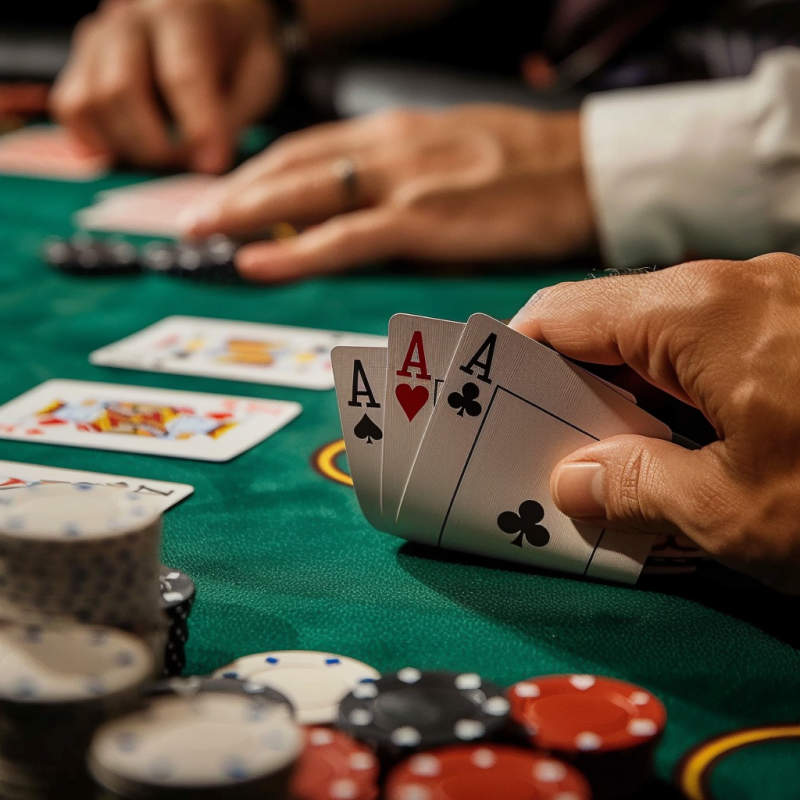Poker Glossary: 83 Terms to Know When Playing Poker


1.0
Default
Learning anything new can be intimidating and tricky to grasp initially. Suppose you’re keen on developing your poker skills. In that case, some terms can be overwhelming to fully understand -but once you do your research, watch some poker players win and lose, and check out strategies online, you will see how each motion works in a game, and it will help you get a better understanding in the long run. Here, we have provided a list of poker terms you should know (or at least familiarize yourself with!) as you begin your journey to becoming a poker pro.
Add on - This is an action step in poker where you can add to your chips by purchasing more preceding the first session.
Ante - Before any wagers are placed on a hand, an ante bet is called.
All-in - This is the action where you decide to place all your remaining chips into the pot.
Bad Beat - The term used when you lose to a player despite the expected odds.
Bankroll - A poker player uses this term to refer to the money they use to play the game.
Base Deal - This is a negligible action in poker considered cheating when a player deals a hand from the bottom of the deck.
Bet - The act of making the first wager in a poker game.
Big Slick - Another term used when you’re dealt with an Ace-King.
Blind(s) - These are the wagers that need to be placed by the player next to the two players sitting to the left side of the dealer.
Blind Bet - Also referred to as the ‘blind’ where you’re forced to make a wager before seeing any other cards (leaving you blindsided, of course.)
Bluff - This is often used when a player bets on a weak hand to dissuade other players into a fold.
Bump - The act of raising a bet in a poker game.
Bust - When a player runs out of money to bet in a poker tournament.
Buy-in - This is the act of exchanging cash for more chits to stay or sit at a poker table.
Call - This is when the player pays for a bet he wagered with chips.
Cap - This term is used in Fixed Limit Hold’em poker where players can raise to a max of four times before the dealer caps them off with just a call or a fold motion.
Case money - Also known as money used for an emergency in a poker game.
Cash-in - This is when a player decides to leave the table to get money for their accumulated chips in exchange for money.

Check - This is when you don’t make a wager when no other player has also placed one during the game.
Check-raise - A check-raise occurs when a player in a poker game checks when they have the chance to place a wager and then raises subsequent bets made in the same round.
Chip - These are used in casino tables instead of real money when making bets in poker.
Community cards - These are cards dealt facing upwards which all players can take from when making their own hands during the game.
Cold call - This is the action of calling two or more bets on your turn. Counterfeit - This is considered a duplicate card which can devalue your hand.
Cut off - This is the position to the right side of the button.
Dealer - This is the appointed player or casino staffer who shuffles the deck and deals the cards.
Door card - This is the first card dealt facing up to every poker player in seven card stud.
Draw - This is the action to remain in a hand while still competing to improve it.
Down to the felt - When a player is out of money to bet.
Fast - The act of playing with aggression.
Fifth Street - This is the term used when the fifth card is dealt in Stud poker.
Flop - This is a term used when dealing with the first three community cards in Hold’em poker.
Flush - This is when five cards of the same suit are drawn but are not placed in sequence.

Fold - To fold is the act of throwing away your cards in a poker game.
Four of a Kind - This is when four cards of the same rank are drawn.
Full House - This is considered to be the hand that shows three cards of one rank and two other cards of another rank.
George - This is the term used when you’re considered poor and have run out of money in a game of poker.
Grinder - This is the term used to describe a player who lacks ambition and only wants small winnings.
Gutshot - The term used when describing an inside straight draw in poker.
Hanger - The term used when a card protrudes noticeably when a cheater is dealing.
Heads up - The last few rounds of poker when only two players are left to play.
High - Considered to be the term used to tell a player they have the best hand.
High Society - A charming way to refer to the players with the chips that values the highest denomination in a card room.
Hold’em - A popular variant of poker often played in casinos and table games.
It - Indicates the highest stakes a player has ever placed in a round.
Implied Odds - Making notes while creating anything, keeping in mind calls you may receive in the future from other players. You anticipate that if you draw correctly, people will raise their hands. Because they are not yet in the middle and won't be until you hit your card and they call your bets, these monies are speculative rather than concrete—hence the term "implied."
Kicker - This is the card involved in building a five-card poker hand but is not included in the formation of a poker combination.
Ladies - The cards with a Queen.
Lay down - The act of conceding in a poker game or giving your hand in.
Limp-in - The act of calling the blind’s size without necessarily raising it.
Live card - The card that no one has seen yet.
Live game - Considered to be an intense poker game with lots of betting involved.
Lock - The term used to describe a hand that is sure to win a small chunk of the pot.
Loose - A term that describes a player that is likely to use a bunch of hands that will raise speculation in their overall gameplay.
Mechanic’s grip - The word used to describe a cheater who manipulates cards during a deal.
Muck - The act of folding or discarding a hand while refusing to show your hand to opponents.
No-limit - A poker betting structure that lets the gambler bet any amount they have in front of them.
Nuts - Another way to describe the finest hand possible.
Nut straight - The term used to describe the highest possible hand in any type of poker game.
Omaha - Another type of Poker that is known as a flop game that shares the attributes of Texas Hold’em.
On the finger - This is the term used when a player’s playing money is given on credit.
Outs - Referred to the live cards that stay on the deck to improve your hand.
Overcard - This word refers to a card that is higher than what is shown in the community cards or higher than the card that is in your hand.
Pair - Two cards of the same rank.
Passive - This is the poker strategy where a player is reluctant to bet or raise.
Poker hands - The five cards you’re dealt and will be playing with.
Pot - The money the winner will get at the end of the poker game.
Raise - The motion to up the size of the largest table bet.
Re-buy - If you lose all of your chips in a tournament early on, you might be given the chance to pay the entry fee once more to receive another set of beginning chips.
Re-raise - The act of raising when another player has also raised.
River - The last five community cards are up for grabs.
Short stack - This is an unideal situation when a player has less than the average chips a player should have.
Short-handed - A situation in a poker game where there are fewer poker players at a table than expected.
Showdown - The portion of a poker game when all players must reveal their hands to determine who wins the pot after a bet is called following the river card.
Straight - The name given to the sequence of consecutive numbers in a hand (5-9 respectively.)
Suited - Term used when the cards are of the same suit.
Tell - The motion indicating the strength or weakness of a hand.
Texas - A type of Poker game also known as Texas Hold’em or Hold’em.
Tilt - This is an indication that shows a player’s anger when their hand may go ‘on tilt’ due to poor quality play and strategy.
Turn - The fourth card from the community pile is also pulled out facing up; also referred to as ‘Fourth Street.’
Whale - The type of poker player who amassed a lot of wealth, making big losses irrelevant.
White meat - Profit from a win.
While poker is a universal game of camaraderie and strategy, it’s also an intimidating table game for beginners. However, every poker pro was always a beginner at one point, and the key to becoming a master of your hand is to know the basics. From all the terms and motions to the sly actions and various types of card combinations, there’s a lot you can gain by revisiting or mastering the basics of a tenured game like poker.
To get a better idea of which casinos to play in, check out our reviews at Gamble Spot for a thorough deep dive into the best casino sites you can ever find.

July 26th, 2024
7 Best Horses that Made A Name in Horse Racing
July 24th, 2024
The Role of the Banker in Baccarat - and Why This Could Sway Your Odds
July 19th, 2024
5 Best Slot Games for Art Lovers to Feast Their Eyes on
July 16th, 2024
Fact or Fiction: Pai Gow Edition – What First-time Players Should Watch Out For
July 15th, 2024
Tech and Horseracing: What to Know about Digitizing the Horsebetting Experience
July 9th, 2024
5 Online Casinos with Less than $20 Minimum Deposit You Should Check Out in 2024
July 3rd, 2024
Debunking Common Lottery Myths: What First-time Bettors Should Know
July 2nd, 2024
What to Know About the State of Michigan and Online Poker in 2024
July 1st, 2024
Debunking Common Baccarat Myths: Why You Should Know Better
June 27th, 2024
Understanding the Legal Aspects of Horse Betting in the US: What to Know in 2024Are you sure?
This will delete all chat history, and I will not remember what we were talking about.
✔
Todays Hot Deals